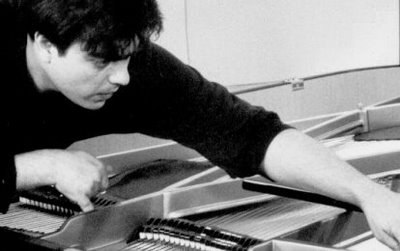Anthony Tommasini has a eulogy today for the much-loved and soon to be gone forever classical music department at Tower Records at Lincoln Center. It was probably the last place in the universe where a perfect stranger would come up to you as you were reading the back of a CD and say “I happened to catch the Sawallisch performance when it was recorded in Vienna. It’s much better.” Sometimes, that person was Sawallisch.
Strange story here about a Texas grandmother who was convicted in New York yesterday of purloining some Glenn Gould memorabilia about 20 years ago and was caught after selling them last year. My favorite part of the story is the bit about her lawyer, a fellow Texan, thought he would score points with a New York jury by suggesting that her cover story about how the papers were given to her by a now dead curator was true because the guy was gay and, thus, untrustworthy. There really are two Americas.
Yet another music social networking site.



 Keys to the Future
Keys to the Future